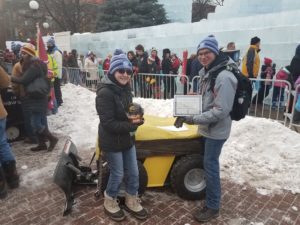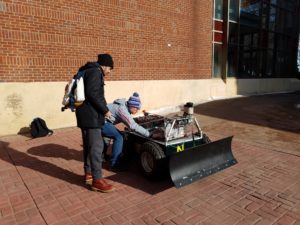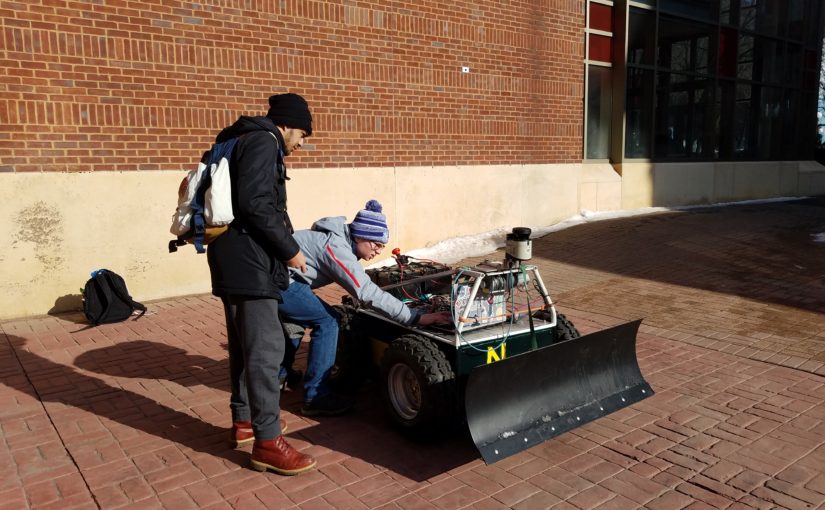From Jan. 25 to 28, the Eighth Annual ION Autonomous Snowplow Competition took place in St. Paul, Minnesota. Four NDSU students a part of Bison Robotics entered together as Team Thundar 2.0 and placed third out of eight teams.

After a rough start, Thundar 2.0 pulled through with third place.
Abdullah Almosalami, a sophomore majoring in electrical engineering and computer science, was the project leader. He was accompanied by three of his other teammates: Andrew Vetter, a sophomore majoring in computer engineering, Rachel Jones, a sophomore majoring in electrical engineering, and Miguel Jara, senior majoring in mechanical engineering.
The competition was for an autonomous snowplow, meaning the snowplow must be pre-programmed to plow without a human controlling the course. Team Thundar 2.0 had multiple different strategies for different courses and obstacles to try and accurately make it through the course.
The snowplow competition includes a final presentation where the teammates explain the mechanical design, electronics, logic and programming safety features, and the commercialization ideas of how they plan to sell the machine. There is also an inspection day to make sure it is legal for competition, to which every competitor has access to the competition’s rulebook online.
The next day consists of the single “I” part, which is when the team must “plow a single 10-meter strip of snow with an obstacle in there and you’re supposed to avoid the obstacle,” Vetter explained.
The final day is triple “I” and advances the course to “three single lines – right next to each other – you plow it, avoid the obstacle in there along with a moving obstacle that gets introduced at some point,” Vetter shared.

Mostly focusing on improving the programming helped the snowplow become reliable.
A couple of years ago the snowplow had started as a senior design project. Since then, Bison Robotics has kept it as a project and continued to improve the electronics and programming for further competitions.
“This year we just worked on programming it and making it better,” Vetter explained.
This led them to be more reliable in their plowing for this competition.
“Once Saturday and Sunday came around, it was very reliable. It plowed consistently, I’d say. Whereas other teams they had various issues and so they were maybe not as consistent, and it was also a larger snowplow — so it made it easier to move more snow at once,” Vetter said.
Team Thundar 2.0 got off to a bad start, with many teammates relaying their frustration and difficulties in the beginning of the competition.
“We had a lot of doubt, and the morale was super low. In fact, we almost decided on not going. But we did, and while our first two days of competition were really rough, we gave it absolutely everything we could, played it smart, and with a bit of luck, we actually got something out of the whole thing,” Almosalami said.
“Friday night we had a bad connection cable that took two hours to find that that was the problem, then another two hours to fix since it was a custom cable,” Jones explained. “Although overall, the competition was fun to go from the struggles at the beginning to winning third place at the end.”
Since Team Thundar 2.0 won third place, they took home a bronze snow globe and $2,000 to make further improvements toward the snowplow.
When discussing the cash prize, Vetter shared, “We want to rewire the electronics. We want to possibly change up the drivetrain. We also want to — there’s a lot of programming improvements that we want to do.”
Why become involved in a snowplow competition, you may ask?
“I’m super passionate about robotics, and working on a robot like Thundar teaches you the essentials of all robots in general,” Almosalami shared.
“I’m interested in programming and applying the stuff I learn and learning more about what makes stuff autonomous,” Vetter said.
When asked about the future of Team Thundar 2.0 and whether the snowplow will be seen again in action, Vetter said, “There’s some stuff that worked well and there’s some stuff that didn’t, so we learned from that.”
They look forward to furthering the snowplow and improving any problems that took place in the competition this year. “There’s still a lot of room for growing — there’s also many different ways to improve,” Vetter shared.
